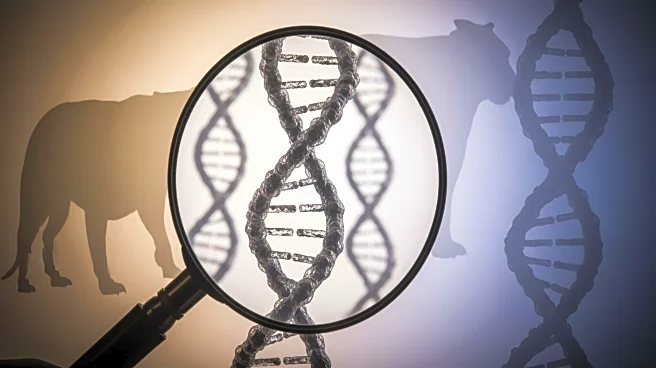What's Happening?
A recent study has explored the role of cyclic GMP-AMP synthase (cGAS) in genome stability and tumorigenesis, focusing on the naked mole rat. The research, led by Zhiyong Mao in collaboration with Baoxue Ge from Tongji University School of Medicine, discovered
that cGAS, typically found in the cytoplasm, translocates to the nucleus in response to DNA damage. In the nucleus, cGAS localizes to DNA damage sites and inhibits homologous recombination repair, which can promote tumorigenesis. The study compared the efficiency of homologous recombination using a GFP-based DNA repair reporter in cells overexpressing naked mole rat, human, or mouse cGAS. It was found that while human and mouse cGAS inhibited homologous recombination, naked mole rat cGAS enhanced it, thereby stabilizing the genome.
Why It's Important?
The findings are significant as they highlight the unique properties of naked mole rat cGAS in enhancing genome stability, contrasting with the tumorigenic effects observed in humans and mice. This research could have implications for understanding aging and cancer resistance in long-lived species. The naked mole rat is known for its longevity and low incidence of cancer, making it a valuable model for studying mechanisms of genome stability and tumor suppression. Insights from this study may contribute to developing new strategies for cancer prevention and treatment by targeting similar pathways in humans.
What's Next?
Further research is likely to focus on understanding the molecular mechanisms by which naked mole rat cGAS enhances homologous recombination and stabilizes the genome. Scientists may explore potential applications of these findings in developing therapeutic interventions for cancer and age-related diseases. Additionally, there may be interest in investigating whether similar mechanisms exist in other long-lived species with low cancer rates, potentially broadening the scope of cancer research and treatment.
Beyond the Headlines
The study raises ethical and scientific questions about the manipulation of genetic pathways for therapeutic purposes. Understanding the balance between genome stability and tumorigenesis could lead to breakthroughs in cancer treatment but also poses challenges in ensuring safety and efficacy. The unique biology of the naked mole rat offers a window into natural cancer resistance, prompting discussions on the ethical implications of translating these findings into human medicine.
















